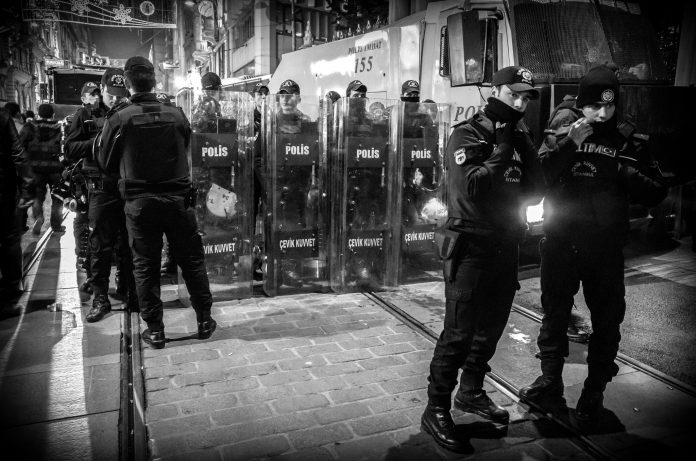Last week I have attended the 37th session of the Human Rights Council is taking place in Geneva as the most important event of the year in the field of human rights between the 26th of February and 23rd of March 2018. Many diplomats, journalists and rights defenders join the events to exchange opinions and information about the recent developments implicating rights of individuals and groups all around the world.
Turkish government is harshly criticized for many violations including widespread torture, the long-lasting state of emergency, arbitrary detentions, inhumane prison conditions and unlawful arrests of the journalists and rights defenders. The representatives of the government tried to respond to the accusations but their effort was way far from convincing.
So, almost the entire international community agree on the existence of a persecution in Turkey. However, the very same international community is still not willing to put enough pressure on the government to stop the ongoing persecution and take the necessary steps to mend what it has already destroyed in the aftermath of the failed coup. For example, the UN Special Rapporteurs have published detailed reports of the violations committed by the Turkish government in the country. For that reason, it was expected from the UN to guarantee safety of Turkish citizens who seek refuge under the UN’s protection out of Turkey. However the UN cannot prevent people who are under its protection to be kidnapped by the people working with the Turkish government nor it can follow up the case and call the Turkish government for releasing the victims and punishing the perpetrators. Also, the UN is not able to impose the ceasefire in Syria on Turkey that was declared by a resolution adopted on the 25th of February 2018 in the Security Council. Turkish government does not recognize the ceasefire and advance its army toward Afrin. President Erdogan said “Damn your ceasefire” blaming the international community for supporting terrorists.
The same unwillingness can be observed at the Council of Europe. Failing to urge Turkey to respect the founding principles of the Council- the rule of law, human rights and democracy-, the leadership of the institution played significant role to create more and more victims under the oppressive rule of the country. The relevant bodies of the Council including the PACE, the Venice Commission alongside the Human Rights Commissioner repeatedly raised their voice over against the implementations of the government. However, the leadership of the Council and the ECtHR which is supposed to be independent and not politically motivated have disappointed the purge victims by not only negotiating with but also mentoring the government about how to defeat its obligations stemming from the European Convention on the Human Rights. Imagine that the Council of Europe is one of the most powerful institutions of the world in the field of the rule of law but its secretary general could not utter a single word during his 2-day visit in Ankara about the infamous aggravated life sentence given to Altan Brothers and Nazli Ilicak.
Another scandalous approach belongs to the ECtHR which implicates hundreds of thousands of people in Turkey. The Court ruled last year that the dismissed public servants should first exhaust the domestic remedies addressing Turkey’s infamous State of Emergency Inquiry Commission. The said commission has been criticized by many including academics like Kerem Altiparmak, a prominent law professor and rights defender, member of the European Parliament and rights defenders for being ineffective and non-impartial. Almost one year has passed after the ECtHR’s ruling and the Commission has examined only 6400 files out of 107.000 according to official figures. Worse is it reinstated only 100 of them to their jobs. It is already proven that it is ineffective and unfair. Furthermore, the Court’s voice is very much weak against the situation of the imprisoned journalists. There are currently 156 journalists behind bars in Turkey. The court has prioritized a few of them to appease the international public. The other journalists one of whom is already rejected are not apparently on the short-term agenda of the Court.
The European Parliament, on the other hand, seems like it cannot decide on how to manage its relationship with Turkey. In its resolutions, the EP voiced its concern over the abolition of the rule of and serious rights violations but again the leadership makes politically motivated and tactical moves. For example, Kati Piri, the Turkey Rapporteur, said that 150.000 persecuted people including philanthropist Osman Kavala, well-known journalist Ahmet Sik and the pro-Kurdish HDP leader Selahattin Demirtas should not be left alone by Europe. Many in the Parliament endeavor to secure the freedom of persecuted people but the EP leadership’s effort is not in the same vein. Ms. Mogherini, the High Representative of the Union for Foreign Affairs and Security Policy, and a number of eurocrats are working on renewal of the Customs Union Agreement with Turkey which economically will relieve Erdogan from the pressure of recent economic decline.
Apparently, the international community will make such mistakes until they learn that appeasement policy will not work with the current Turkish leadership. Blackmailing with refugees, Syrian crisis or Turkish/Muslim minorities in Europe will always make Erdogan feel that Europe will have to get along with him no matter it voices against unlawful practices of his government.
Dr Ugur Tok is the Director of Platform for Peace and Justice in Brussels, http://www.platformpj.org/

